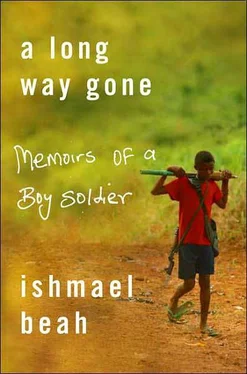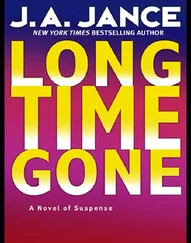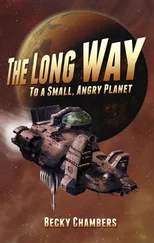I put the raw rice back into my bag and started walking down the dirt road to find a suitable place to sit for the night. There were people sleeping under the bushes near the bus stop. This way, they would be able to hear the bus if it pulled up during the night. Farther down, there were others clearing spaces under branches of plum trees that had woven into each other. They pushed the dried leaves aside with their hands and piled up fresh leaves to make headrests on the ground. One of the men made a broom from the branches of a tree, which he used to effectively push the leaves aside. I jumped over the gutter, sat against a tree, and, throughout the night, thought about my uncle and then my father, mother, brothers, friends. Why does everyone keep dying except me? I walked up and down the road trying not to be angry.
In the morning people stood up and dusted themselves off with their hands. Some of the men washed with dew. They shook leaves of little plants and trees, rubbing the residue of water onto their faces and heads. After hours of waiting impatiently, we heard the clunking of an engine down the road. We weren’t sure if it was the bus, so we gathered our bags and hid in the bushes near the road. The sound of the whining engine grew until the bus could finally be seen. Everyone ran out of hiding and hailed the bus until it came to a stop. We hurriedly piled on and were off. As the bus proceeded, the apprentice came around to collect the fare. I paid half price, because I was under eighteen, but half price in those times was more than full price when everything was peaceful. I looked out the window and watched the trees go by. And then the bus began to slow down and the trees were replaced by soldiers with big guns, all aiming at the road, at the bus. They asked everyone to step out of the bus; then they made us walk through a barricade. I looked around, and in the bushes I saw there were more men with submachine guns and grenade launchers. I was observing the formation they had and almost ran into a soldier who was making his way to the bus. He looked at me with bloodshot eyes and a face that said, “I will kill you if I want to and nothing will come of it.” The look was familiar to me.
They checked the bus for reasons nobody understood. After a few minutes, everyone was on board again. As we gradually started moving, I watched the barricade disappear and I recalled when we used to attack such barricades. I dismissed the thoughts before I was transported back to those times. There were too many barricades, and at every one of them the soldiers behaved differently. Some demanded money even when passengers had the correct documents. Refusing to pay, one risked being sent back to the city. Those who didn’t have money had their watches or jewelry or anything of value taken from them. Whenever we were approaching a roadblock, I would quietly start reciting prayers that I hoped would aid my passing through it.
At about four in the afternoon, the bus reached a town called Kambia, its final destination. For the first time since we left the city, I saw some of the passengers’ faces relax a bit. But soon enough, our faces tensed again, and we all grumbled as the immigration officers also asked us to pay before we could cross the boundary. Everyone reached into their socks, the hems of pants, under headties, to get the remainder of their money. A woman with two seven-year-old boys pleaded with the officer, telling him that she needed the money to feed her boys in Conakry. The man just kept his hand out and yelled at the woman to step aside. It sickened me to see that Sierra Leoneans asked money from those who had come from the war. They were benefiting from people who were running for their lives. Why does one have to pay to leave his own country? I thought, but I couldn’t argue. I had to pay the money. The immigration officers were asking for three hundred leones, almost two months’ pay, to put a departure stamp in passports. As soon as my passport was stamped, I crossed the border into Guinea. I had a long way, over fifty miles, to get to Conakry, the capital, so I walked fast to take another bus that would get me there. I hadn’t thought about the fact that I didn’t know how to speak any of the languages in Guinea. I became worried a bit but I was relieved to have made it out of my country alive.
The buses to Conakry waited on the other side of a checkpoint that had been erected by Guinean soldiers. There were men standing near the checkpoint selling Guinean currency at whatever rate they pleased. I thought the soldiers would be against such black-market foreign exchange, but they didn’t seem to care. I changed my money and walked toward the checkpoint. The border was crowded with soldiers who either didn’t speak English or pretended not to. They had their guns in ready positions, as if they expected something to happen. I avoided eye contact, afraid that they might see in my eyes that I had once been a soldier in the war that I was now leaving behind.
There was a dark brown wooden house through which I had to pass to get to the bus. Inside this house the soldiers searched people’s bags, and the people would then go outside and present their documents to the officers. When I was in the wooden house, the soldiers tore open my bag and threw all its contents on the floor. I didn’t have much, so I had little difficulty repacking: two shirts, two undershirts, and three pairs of pants.
I emerged from the wooden house and felt as if all the soldiers were looking at me. We were to present our documents, but to whom? There were too many tables. I didn’t know which one to go to. The soldiers sat under the shade of mango trees dressed in full combat gear. Some had their guns hanging by the straps on their chairs, and others placed theirs on the table, the muzzle facing the wooden house. This way, they made people nervous before they asked them for money.
A soldier who sat on the far right of the lined tables, a cigar in his mouth, motioned for me to come over. He put his hand out for my passport. I gave it to him without looking at his face. The soldier spoke a language that I couldn’t understand. He put my passport in his chest pocket, took the cigar out of his mouth, placed his hands on the table, and sternly looked at me. I looked down, but the soldier lifted my chin. He took the cigar out of his mouth and examined my passport again. His eyes were red, but he had a grin on his face. He folded his hands and sat back in his chair, looking at me. I smiled a bit and the soldier laughed at me. He said something in his language and put his hand out on the table again. This time the grin on his face had disappeared. I placed some money in his hands. He smelled the money and put it in his pocket. He pulled my passport out of his pocket and motioned for me to go through the gate.
On the other side were a lot of buses. I was confused about which one to take to Conakry. Everyone I tried to ask for directions didn’t understand what I was saying. The only word I knew in French was bonjour , which did me no good.
I was confusedly looking for a bus to the capital when I bumped into a passerby.
“Watch wussai you dae go,” the passerby grumbled in Krio.
“Me na sorry, sir,” I replied. “How de body,” I continued, shaking hands with the stranger.
“Me body fine en waitin you dae do na ya so me pekin?” the man asked me.
I told him that I was looking for the right bus to Conakry. He told me that he was heading there as well. The bus was overcrowded, so I stood for most of the trip. In over fifty miles to the capital there were more than fifteen checkpoints and the soldiers were unmerciful. All of the roadblocks looked the same. Jeeps with mounted guns were parked along the road. Two soldiers stood by the metal pole stretched across the road from one gutter to another. On the right, more soldiers sat under a shack covered with tarp. There were a few compartments of the shack, where the soldiers searched people. They had set a fixed price for all Sierra Leoneans; those who couldn’t pay were kicked off the bus. I wondered if they sent the people back to the other side of the border. Under the auspices of the man I had boarded the bus with, I was able to pass some of the roadblocks for free. Most of the soldiers thought I was the man’s son, so they checked his documents and not mine and charged him for both of us. I don’t think he noticed; he just wanted to get to Conakry, and it seemed money wasn’t a problem for him. At one of the roadblocks the soldiers took me into a room and made me undress. At first I didn’t want to take off my clothes, but I saw them kick a man to the floor and rip his shirt and pants. One of the soldiers took my belt. The belt buckle had the head of a lion on it and it was my favorite. I held my pants with one hand and ran back to the bus. I pressed my teeth hard together and folded my fist, holding back my anger.
Читать дальше












